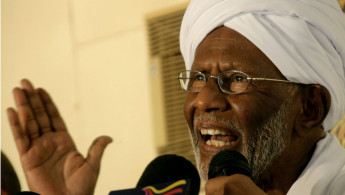Sudanese opposition leader and Islamist icon Hassan al-Turabi dies
Veteran Sudanese opposition leader Hassan al-Turabi has died of a heart attack aged 84, a medical source told AFP.
The Islamist leader was one of the fiercest critics of President Omar al-Bashir's government, despite being at one time the Sudanese leader's closes aides.
Turabi was taken to the intensive care unit of Khartoum's Royal Care hospital "after suffering a heart attack in the morning and died" there, the source told AFP.
As news of his death became known, state television interrupted its regular programming and broadcast Islamic verses from the Koran that are recited for the dead.
Turabi was for a decade a key figure in Bashir's regime following his 1989 coup.
He went on to become one of his fiercest critics and called for the leader's overthrow.
Turabi was detained in May 2010, a month after Sudan's first competitive polls since 1986 for denouncing the election as fraudulent.
He was the only Sudanese politician to support a warrant issued for Bashir's arrest by the International Criminal Court (ICC) on charges of war crimes, crimes against humanity and genocide over the regime's conduct of the conflict in Darfur.
After breaking ranks with Bashir he formed his own party, the Popular Congress Party.
Turabi was detained several times over a career spanning four decades, including in January 2009 two days after he urged Bashir to surrender to the ICC.
An ideologue with influence beyond Sudan's borders, Turabi was one of the driving forces behind the introduction of Islamic sharia law in Sudan in 1983, which sparked a devastating 22-year civil war with the mainly Christian, African south that cost an estimated two million lives.
The Western-educated Turabi held a master's degree in law from London and a doctorate from Sorbonne University in Paris.
He spoke English, French and German fluently as well as Arabic, and his language skills helped him gain access to foreign news media through which he issued repeated calls for an international Islamic revolution.





 Follow the Middle East's top stories in English at The New Arab on Google News
Follow the Middle East's top stories in English at The New Arab on Google News


